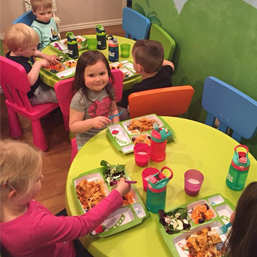
I’ve been running a private dayhome/preschool for almost 16 years. I wipe many littles’ tears, read them stories, kiss their scraped knees, cook their favorite meals, teach them how to write their names, and rock them to sleep. In the winter, I bundle those little bodies into their snowsuits to go outside and build snow castles and in the summer, I apply sunscreen to those same little bodies, so they can run through the sprinklers and enjoy picnics in the park. And when the sun doesn’t shine, we improvise and run in the rain. We visit the animals at the zoo, and we go on hikes and other adventures, too! Working as a private dayhome provider is crazy, exhausting, and non-stop, but so rewarding because I know that I am positively impacting and shaping young minds.
What does it take to run a successful dayhome?
Early on, I knew that I wanted to teach preschool and work with toddlers and preschoolers, so I chose my university classes and degree in early child education accordingly. For those starting out or looking to improve their knowledge in this field, I recommend taking courses in early childhood development and education, child psychology, nutrition, car seat safety, and SIDS (Sudden Infant Death Syndrome) prevention.
Some dayhome providers choose to go with an agency and they can then provide subsidy and assurance of their ongoing training to their clients. Others opt for the private route. I encourage all dayhome providers, whether with an agency or private, to continue learning. Individually study, read articles, and regularly attend sessions, courses, conferences, workshops, seminars, etc., about early childhood education and development. It’s also a good idea to build a support network with other providers and teachers. Their help and advice will help you immensely in this career. As a dayhome provider, you also need to keep your CPR and First-Aid current, and as a private dayhome provider, you and any adults over the age of 18 living in your home need to pass a Vulnerable Sector Police Check.
Legally, a private dayhome can care for up to six children at a time (excluding their own children). Dayhome providers should have a clear contract in place, outlining expectations of a client, and vice versa. My contract to clients includes an overview of what a day at my dayhome/preschool looks like; days and hours of operation, including statutory holidays, etc.; my illness policy; a sample of my food menu served to the kids (based on Canada’s Food Guide), and a sheet asking for information on the client’s child and their routine at home, including their likes and dislikes, as well as if the child has an allergy or any other medical condition. You should also include permission slips for photography of any kind that will involve their child - whether for a craft or advertising, or even for a private website made just for the business and only seen by the families in your care. Permission slips for holiday parties, outings, and transportation are also important.
Liability insurance is another must and you will need extra insurance if you plan to transport the kids while in your care. Having a schedule that implements a combination of structured learning or activities along with free play will keep your group active and engaged. Communication with the parents is another key component and helps keep everyone on the same page. And last but not least, self-care is extremely important and will help combat burnout. Find a sport, hobby, art class, etc., you enjoy outside of work hours. In the evenings, take a bubble bath and enjoy a glass of wine if that’s your thing!
How to choose the best dayhome provider for you and your child
When interviewing a potential dayhome provider for your child, I always advise parents to first ask the potential provider, “Why did you choose this career?” If their answer is, “To stay home with my own kids,” it’s an immediate ‘red flag’ in my mind. Unfortunately, the burnout rate is high for providers who go into this career with this kind of mindset, thinking it’s an easy babysitting-type job. This career entails so much more than just looking after some kids. A good dayhome provider wants to teach your child and help grow and shape your child’s mind.
Dayhome checklist
In early childhood, learning through play is vitally important. Look for a playroom/classroom environment that is set up to inspire and challenge your child to discover, ask lots of questions, play, and let kids be kids!
Ask the provider what a typical day looks like in their program. For example:
Other observations to make when visiting a potential dayhome:
There is nothing quite like having a part in educating young minds during their most critical years of development. I don’t take this role lightly and encourage those searching for that perfect childcare setup for your child to ask questions but also to look for that passion and drive in your future childcare provider because there are some incredible ones out there.
Jenny, her husband, Kris, and their four children (Cody, Kiley, Caedon, and Connor) live in Airdrie. Jenny enjoys family time, the beach, kickboxing, and teaching preschool, of course!
Calgary’s Child Magazine © 2024 Calgary’s Child